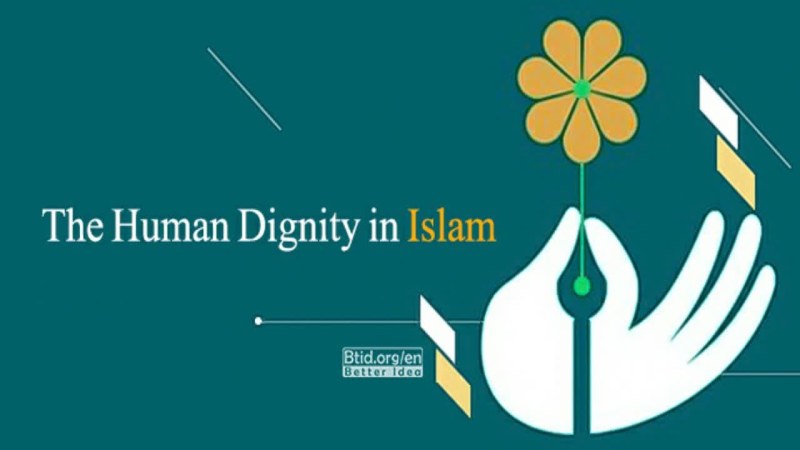"Dignity" has been considered as one of the most basic human characteristics and has been in the focus of human studies for a long time. In its general sense, this term expresses the inherent value and superiority of man over other creatures. Each of the religions, schools and human studies have specified the inherent dignity of human beings, and demand the preservation, cultivation and excellence of this divine gift.

"Dignity" has been considered as one of the most basic human characteristics and has been in the focus of human studies for a long time. In its general sense, this term expresses the inherent value and superiority of man over other creatures. Each of the religions, schools and human studies have specified the inherent dignity of human beings, and demand the preservation, cultivation and excellence of this divine gift. These concerns were manifested in the form of the Universal Declaration of Human Rights, which first article emphasizes the preservation of human dignity: “All human beings are born free and equal in dignity and rights. They are endowed with reason and conscience and should act towards one another in a spirit of brotherhood”.
The Literal meaning of dignity:
Dignity means getting rid of lowliness and humiliation. In other words, human dignity means the greatness and integrity of his soul and the gem of his soul from any lowness.
The Meaning of Human Dignity in the Quran:
The most significant verse for pursuing the issue of human dignity is the 70th verse of Surah Al- Isra, which says: “Indeed, We have dignified the children of Adam, carried them on land and sea, granted them good and lawful provisions, and privileged them far above many of Our creatures”.[1]
The verse clearly states that dignity is a divine gift for man that distinguishes him from other creatures and is the reason for his superiority over others. This verse clearly proves that the Almighty God honored the children of Adam by nature and gave them superiority over a large amount of the universe. For this reason, decisively and clearly, human beings must recognize this dignity for each other as a right and see themselves as obligated to that right.[2]
Human Dignity in Tradition:
From the very beginning of his mission, the Holy Prophet gave dignity to human beings and did not differentiate between black and white, free and slave. This behavior continued in the Prophet's family, who are the main successors of the Prophet. One of the companions of Imam Reza (AS) narrated: "I was with Imam Reza (AS) on a trip to Khorasan. One day he asked for a table and called all the servants and slaves to him. I said: I will sacrifice you, I wish you would set a separate table for them!" He said: Stop! God is the same for all of us, everyone's parents are the same, and the reward is for the deeds."[3]
Conclusion:
The Qur'an has spoken of two types of dignity about human beings: “Formative dignity” and “Acquired dignity”. Looking at the many verses that speak about human dignity, we find that all human beings have been given more honor in comparison with other creatures, which is the formative dignity. Some have achieved acquired dignity through their piety, discretion and effort. The socond one has a higher value than the first type of dignity.[4][5]
References:
[1] Quran:(17:70) وَلَقَدْ كَرَّمْنَا بَنِىٓ ءَادَمَ وَحَمَلْنَـٰهُمْ فِى ٱلْبَرِّ وَٱلْبَحْرِ وَرَزَقْنَـٰهُم مِّنَ ٱلطَّيِّبَـٰتِ وَفَضَّلْنَـٰهُمْ عَلَىٰ كَثِيرٍۢ مِّمَّنْ خَلَقْنَا تَفْضِيلًۭا
[2] https://ajsm.atu.ac.ir/article_22.html
[3] Bihar, v. 49, P. 141 عِدَّةٌ مِنْ أَصْحَابِنَا عَنْ أَحْمَدَ بْنِ مُحَمَّدٍ عَنْ عَبْدِ اللَّهِ بْنِ الصَّلْتِ عَنْ رَجُلٍ مِنْ أَهْلِ بَلْخٍ قَالَ: کُنْتُ مَعَ الرِّضَا (ع) فِی سَفَرِهِ إِلَى خُرَاسَانَ فَدَعَا یَوْماً بِمَائِدَةٍ لَهُ فَجَمَعَ عَلَیْهَا مَوَالِیَهُ مِنَ السُّودَانِ وَ غَیْرِهِمْ فَقُلْتُ جُعِلْتُ فِدَاکَ لَوْ عَزَلْتَ لِهَؤُلَاءِ مَائِدَةً فَقَالَ مَهْ إِنَّ الرَّبَّ تَبَارَکَ وَ تَعَالَى وَاحِدٌ وَ الْأُمَّ وَاحِدَةٌ وَ الْأَبَ وَاحِدٌ وَ الْجَزَاءَ بِالْأَعْمَالِ
[4] Quran (49:13) يَا أَيُّهَا النَّاسُ إِنَّا خَلَقْنَاكُمْ مِنْ ذَكَرٍ وَأُنْثَى وَجَعَلْنَاكُمْ شُعُوبًا وَقَبَائِلَ لِتَعَارَفُوا إِنَّ أَكْرَمَكُمْ عِنْدَ اللَّهِ أَتْقَاكُمْ إِنَّ اللَّهَ عَلِيمٌ خَبِيرٌ
[5] Universal Declaration of Human Rights, Article 1



